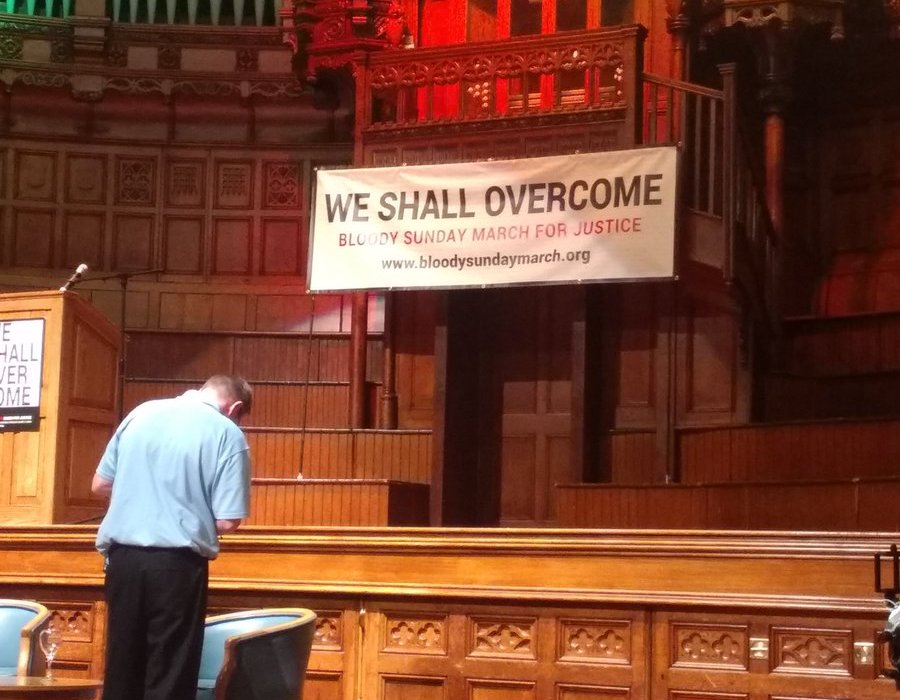[embedded content] In what was a tremendous honour, the Bloody Sunday March organising committee invited me to Derry’s Guildhall to deliver the annual memorial lecture highlighting the legacy of Bloody Sunday and linking it with Brexit and DiEM25’s pan-European campaign for democracy and shared prosperity. An audio of my talk is now available here. Afterwards, I was treated to the even greater honour of a public discussion with the legendary civil rights campaigner Bernadette Devlin – DiEM25’s latest member! Why ‘Bloody Sunday, Brexit & the democratic process?” – the rationale for this event, as published at the organisers’ website (click here) Much like many other parts of the world at
Topics:
Yanis Varoufakis considers the following as important: Brexit, Campaigning, English, Speech
This could be interesting, too:
Robert Skidelsky writes Speech on the Spring Budget Statement 2023
Robert Skidelsky writes Speech on the Autumn Statement 29 November 2022
Frances Coppola writes The dismal decade
Mike Norman writes My new podcast episode is out

In what was a tremendous honour, the Bloody Sunday March organising committee invited me to Derry’s Guildhall to deliver the annual memorial lecture highlighting the legacy of Bloody Sunday and linking it with Brexit and DiEM25’s pan-European campaign for democracy and shared prosperity. An audio of my talk is now available here. Afterwards, I was treated to the even greater honour of a public discussion with the legendary civil rights campaigner Bernadette Devlin – DiEM25’s latest member!
Why ‘Bloody Sunday, Brexit & the democratic process?” – the rationale for this event, as published at the organisers’ website (click here)
Much like many other parts of the world at that time, the North of Ireland was undergoing a process of profound political change in the early 1970’s. By the time January 1972 came around the Northern Ireland Civil Rights Association (NICRA) had already been holding peaceful protests and marches for close on 4 years.
From the outset the Northern state had chosen to respond violently to NICRA’s modest demands and this eventually led to the British government introducing armed troops onto the streets in August 1969. This militarised situation was further heightened with the commencement of the IRA’s bombing offensive in 1970.
Then in August 71 the state introduced internment without trial and on Sunday, January 30th 1972 NICRA responded by holding an anti-interment march in Derry city, which tragically ended with 28 civilian marchers being shot by the British army, 13 of whom died that day.
Today all across the world we see people continuing to express that desire for democratic change, whether that’s through the ‘Arab Spring’ protests, which erupted in many middle eastern countries several years ago or with Scotland’s Independence referendum of 2014 or last year with the UK’s ‘Brexit’ referendum and again more recently with the Catalonian government’s declaration of independence from the Spanish state.
Equally and despite the election last year of a racist, sexist, Islamophobe president the American people, by electing Donald Trump, have clearly demonstrated their desire for real and urgent democratic change.
What then does this all mean for global society and more specifically how might these seismic changes effect Ireland and its relationship with our nearest neighbour.
Britain’s Brexit decision has introduced an air of anxiety and instability into European politics, which in turn has provoked heated debate and soul searching around the question of the border here and for many this instability has brought the imperative of a united Ireland much closer.
However, in response to justified demands for change and accountability, many governments and institutions have chosen different forms of repression or censure, be that with the Spanish government’s recent violent response to democratic Catalonian nationalism, the EU’s punishing fiscal water-boarding of the Greek economy or through EU Troika diktats delivered to the Southern Irish state.
Allied to this we also worryingly see a growing sense of misanthropy from authority across the world, where people fleeing war, poverty and famine are being vilified and portrayed as the problem rather than the political systems or governments they are fleeing from.
It is in this context that the Bloody Sunday March Committee decided to invite acclaimed economist and former Greek finance minister Yanis Varoufakis to address the question of why now are so many people across the world demanding change and democratic accountability and what in his view will these changes mean for the people of these islands.
Furthermore, given the hardening of positions and the general move to the right in European politics we have asked him to also offer his thoughts on what could happen if governments and institutions choose to resist and in some cases violently suppress those same democratic demands.
“Their Epitaph is in the Continuing Struggle for Democracy”
(Inscription on Bloody Sunday Monument, Rossville St. Derry)

